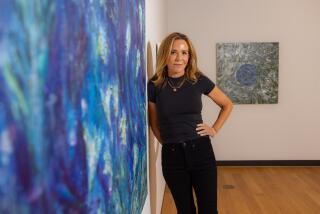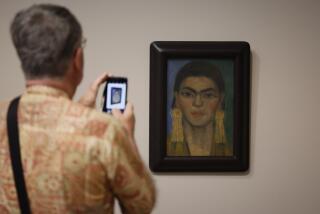Review: Kirsten Tradowsky: In turning photos into paintings, she blurs faces, races and the walls between us
Painter Kirsten Tradowsky and gallerist Paul Kopeikin both collect what’s called vernacular photography, trawling flea markets and the like for other people’s images.
Tradowsky’s current exhibition, “Time Echo,” is a collaboration: Kopeikin shared photographs from his collection, and Tradowsky made paintings from them. The resulting images are ambivalent echoes of orphaned personal histories.
Executed in a broad, brushy style, the paintings gloss over the details, from minutiae like fabric creases to more consequential things like facial features and racial identities. In this sense, they are erasures, replacing the specificity of photography with broad impressions — collections of shapes and colors.
Some of the original photographs are available in an album at the front desk. If you compare the swimsuit-clad, heterosexual couple in the painting “August 2” with its source, it’s clear that the painting obscures not only the nonwhite racial identity of the woman but more important her rather sour facial expression.
The paintings are like memories, fragmented and vague. They also raise the question of who is doing the remembering.
The photographs, which appear to have been taken in the last 60 years but before the advent of digital photography, are precursors to selfies. They show middle-class people documenting themselves and the events they deemed important: vacations, new cars, birthdays, concerts.
Whereas life in poorer communities has often been documented by outsiders, the middle class has had the privilege of recording their own narratives, even if they eventually end up on a flea market table. The preponderance of women posing next to automobiles also suggests that many of these images were probably taken by men.
The curious blankness of Tradowsky’s paintings in some ways normalizes this middle-class, male gaze. But it is also an invitation. In blurring and erasing some of the specificity of these images, she invites us to project our own memories and associations upon them. We might have similar photos in our family albums at home.
Tradowsky’s project reveals how images we thought specific to our own histories are actually part of a patchwork of American experience. It seems memes were circulating long before the Internet arrived.
Kopeikin Gallery, 2766 S. La Cienega Blvd., (310) 559-0800, through July 7. Closed Sundays and Mondays. www.kopeikingallery.com
See all of our latest arts news and reviews at latimes.com/arts.
More to Read
The biggest entertainment stories
Get our big stories about Hollywood, film, television, music, arts, culture and more right in your inbox as soon as they publish.
You may occasionally receive promotional content from the Los Angeles Times.










